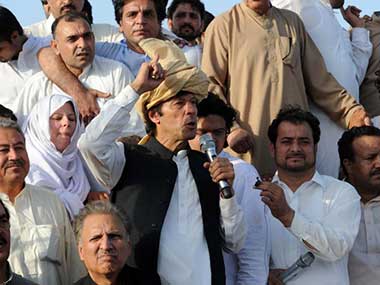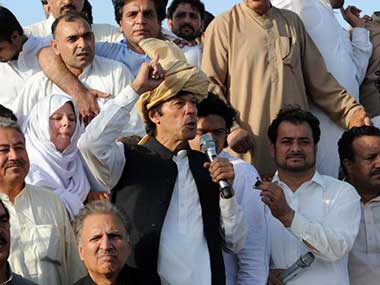A theme that has historically defined Pakistan – the spasmodic alternation between quasi civilian rule and army’s control of the country- has a searing resonance once again. This time, the ‘crisis state’ has been brought to the brink by the twin protests led by the celebrity cricketer, Imran Khan, and the cleric , Tahir-ul Qadri. Both have challenged the Nawaz Sharif government and impugned it on grounds of corruption and mis-governance. The protests have now acquired crisis proportions and the Army Corps commanders under General Rahil are slated to hold a meeting about the crisis. It is held that the protests and the denouement are endangering the security of the country. This could be true or another pretext for the army to take overt control of Pakistan. [caption id=“attachment_1690403” align=“alignleft” width=“380”]
 Cricketer-turned-politician Imran Khan. AFP[/caption] If the ostensible rationale of the protests is taken at face value, then these reflect the deep structural and existential crisis that the state of Pakistan is undergoing. The question is: would the protests alter the nature of the Pakistani state and its political class? What is the real nature of the problem? What could take Pakistan out of the morass it is in? These questions are of vital import and significance to Pakistan, the region and the world at large. In the words of Christine Fair, an American analyst and academic, Pakistan is a hollow state. The implication here is clear cut: the country’s institutions have hollowed out and are failing the country and its peoples. The problem then is largely institutional. The protests, while they do reflect the extent of problems that the Pakistani state and society suffer from, neither solve the problem nor offer an antidote. The problem is institutional and the solution lies in creating and forming new, vibrant and dynamic institutions. How is the question? This is a poser. The answer may lie neither with Imran Khan nor Tahir ul Qadri but with Pakistan’s real power structure and power elite. The reference here is to the army-intelligence combine which political scientists have called the oligarchic-praetorian elite. So entrenched and implicated is this power elite into the entrails of the Pakistani state and institutional firmament of the country, that nothing is possible without their assent and concurrence. Be it the country’s internal peace and security, relations with India and Afghanistan and the world at large, it is the army-intelligence combine that can and will determine Pakistan’s trajectory and denouement. The rest is merely hogwash and self indulgence. It is this power elite of Pakistan that has to review the nature of Pakistan’s institutional superstructure and sub structure, the country’s politics and political economy, and concomitantly its security and foreign policy. Of course, what should inform the review should be Pakistan’s national interest. At this point in time, the country’s national interest is to become a normal nation state- at peace with itself and the world at large. This would call for an institutional rejig of the institutions of the country. Initially, it may mean the re-establishment and control of the country overtly and the following it up with a strategy of gradual reform. This has been done in the past with success. Portugal comes to mind here. (It may be conceded here that the European Union and entry into this club constituted one major inducement for the junta in Portugal to relinquish control of the state). This condition does not obtain for Pakistan. What could then be the motivation for the army-intelligence combine in Pakistan to abdicate power? The answer again is Pakistan’s national interest and to sake Pakistan from Pakistan. Pakistan’s power elite must realize the import of the deep , structural problems are leading the country to an abyss and then follow up by forging institutions and pathways that actually and ultimately make it one of the players in Pakistan and create space for a clean and robust politics. This may seem counter intuitive and even naive but there does not appear to be a way out. Continuing with the same paradigm and path is rife with peril for Pakistan itself and has implications and consequences for the region and the world. It is a travesty that India cut off talks with Pakistan at a time when the country is in deep trouble. Instead of obstructionism based on schaden freuder and glee at Pakistan’s troubles and cutting off lines of communication with the country, Pakistan’s neighbour’s, especially India should offer a helping hand. This could constitute healthy and new diplomacy-one that breaks itself from the shackles of the past. Pakistan is unlikely to disintegrate and break apart. It will, most likely, muddle along. However, this is not what the country needs. It needs a new idiom , smelling of roses, that brings out the creative potential of its peoples that reaches efflorescence. Institutional rejigg and reform is the sine qua non of this. It is about time that the country’s power structure introspects and carries out a review. The country itself, its neighbours and the world is vested in this.
Cricketer-turned-politician Imran Khan. AFP[/caption] If the ostensible rationale of the protests is taken at face value, then these reflect the deep structural and existential crisis that the state of Pakistan is undergoing. The question is: would the protests alter the nature of the Pakistani state and its political class? What is the real nature of the problem? What could take Pakistan out of the morass it is in? These questions are of vital import and significance to Pakistan, the region and the world at large. In the words of Christine Fair, an American analyst and academic, Pakistan is a hollow state. The implication here is clear cut: the country’s institutions have hollowed out and are failing the country and its peoples. The problem then is largely institutional. The protests, while they do reflect the extent of problems that the Pakistani state and society suffer from, neither solve the problem nor offer an antidote. The problem is institutional and the solution lies in creating and forming new, vibrant and dynamic institutions. How is the question? This is a poser. The answer may lie neither with Imran Khan nor Tahir ul Qadri but with Pakistan’s real power structure and power elite. The reference here is to the army-intelligence combine which political scientists have called the oligarchic-praetorian elite. So entrenched and implicated is this power elite into the entrails of the Pakistani state and institutional firmament of the country, that nothing is possible without their assent and concurrence. Be it the country’s internal peace and security, relations with India and Afghanistan and the world at large, it is the army-intelligence combine that can and will determine Pakistan’s trajectory and denouement. The rest is merely hogwash and self indulgence. It is this power elite of Pakistan that has to review the nature of Pakistan’s institutional superstructure and sub structure, the country’s politics and political economy, and concomitantly its security and foreign policy. Of course, what should inform the review should be Pakistan’s national interest. At this point in time, the country’s national interest is to become a normal nation state- at peace with itself and the world at large. This would call for an institutional rejig of the institutions of the country. Initially, it may mean the re-establishment and control of the country overtly and the following it up with a strategy of gradual reform. This has been done in the past with success. Portugal comes to mind here. (It may be conceded here that the European Union and entry into this club constituted one major inducement for the junta in Portugal to relinquish control of the state). This condition does not obtain for Pakistan. What could then be the motivation for the army-intelligence combine in Pakistan to abdicate power? The answer again is Pakistan’s national interest and to sake Pakistan from Pakistan. Pakistan’s power elite must realize the import of the deep , structural problems are leading the country to an abyss and then follow up by forging institutions and pathways that actually and ultimately make it one of the players in Pakistan and create space for a clean and robust politics. This may seem counter intuitive and even naive but there does not appear to be a way out. Continuing with the same paradigm and path is rife with peril for Pakistan itself and has implications and consequences for the region and the world. It is a travesty that India cut off talks with Pakistan at a time when the country is in deep trouble. Instead of obstructionism based on schaden freuder and glee at Pakistan’s troubles and cutting off lines of communication with the country, Pakistan’s neighbour’s, especially India should offer a helping hand. This could constitute healthy and new diplomacy-one that breaks itself from the shackles of the past. Pakistan is unlikely to disintegrate and break apart. It will, most likely, muddle along. However, this is not what the country needs. It needs a new idiom , smelling of roses, that brings out the creative potential of its peoples that reaches efflorescence. Institutional rejigg and reform is the sine qua non of this. It is about time that the country’s power structure introspects and carries out a review. The country itself, its neighbours and the world is vested in this.
Why PTI's Imran Khan can't save the 'hollow state' of Pakistan
Wajahat Qazi
• September 1, 2014, 09:15:33 IST
Pakistan’s power elite must realize the import of the deep , structural problems are leading the country to an abyss and then follow up by forging institutions and pathways that actually and ultimately make it one of the players in Pakistan and create space for a clean and robust politics.
Advertisement
)
End of Article